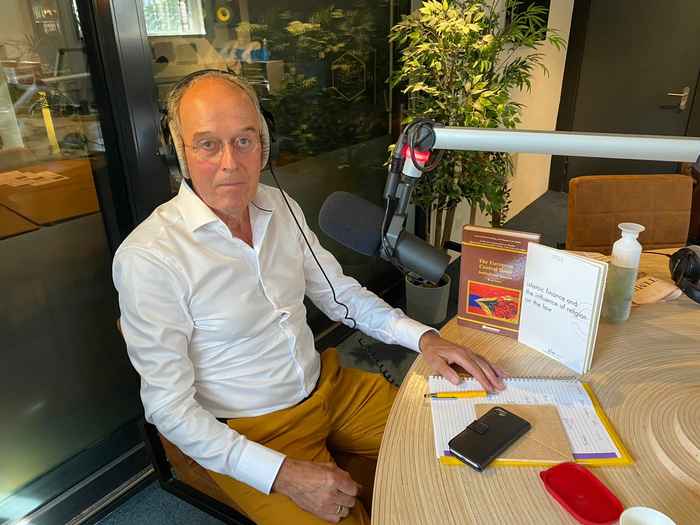René Smits is Lecturer of the Year
21 October 2020

Congratulations! How was the ceremony?
'Amazing. Actually, I expected that Vincent Odekerken of the medical faculty would win the prize, given the great pressure on health care in these Covid 19-ridden times. The moment one of the jury members, Taimoor Baig, announced that the chosen teacher had kept in touch with students even after the lectures, a bell started ringing. Yet it was a surprise, both this time and during the previous presentation of the faculty title, in May.
Before the results of the jury were announced, all faculty winners came together in a Zoom meeting. I learned a lot from the conversations with them. We discussed dual teaching, both online and physical, and exchanged views on how academics are regarded in times of myth formation and misinformation. And, of course, it was very interesting to meet with a scientist, a physician, a practitioner of humanities and others. At the closing of the Education Day, Rector Karen Maex spoke about “connection”, which really appealed to me, because that is exactly what I consider important as a teacher and what the jury indicated as my strong point.'
So, connection is central in your lectures. How do you achieve that as a teacher?
'I don't really know how I go about that. Making connection is almost a second nature, which I also apply, for instance, with passers-by. I consider that without connection the process of transferring knowledge and learning will not come about. When in front of a group of students, I try to sense how they feel about me and the subject, which I then respond to. Enthusiasm for the subject is very important. I try to convey this fire to students. Interpreting the technical matter in the broader context also helps to "take students along". Often, a connection is established with a few students first and the rest gradually follows.
A good example is the use of silence in lectures. When students enter the lecture hall, they are often still occupied with all kinds of things: “Did I lock my bike? How will that presentation go? What again did we have to prepare? ” First, I let the natural peace return and then I let that silence work for a while. It's important to be able to leave the hustle and bustle behind one for a while. Everyone can then reflect on what they expect from the meeting and what they may contribute to it.'

When students enter the lecture hall, they are often still occupied with all kinds of things: "Did I lock my bike?"Professor René Smits
Has your style changed over the years?
'Certainly, yes. I have become more and more myself in the lecture hall. Actually, I'm always a bit nervous beforehand. Such "stage fright" improves one's performance and provides focus. But, over time, the nerves diminish because one can trust what one has been able to do in the past. The older you get, the less you care about what others think of you. And if you have something to say, do it now, because you don't know when you'll get the chance again. My heart still beats for the same subjects: the European Union, European law and the interface between practice and theory. I really enjoy telling about that.'
Do you have any tips for students who want to become a teacher themselves?
'Everyone needs to find their own voice and find a way to convey knowledge that works for them. It helps to keep lectures accessible and to connect with students. Mutual respect is also very important. All questions are welcome. As a tip, I would say: Look at a teacher that you were completely enthused about, for example in high school. A good teacher ensures that you feel connected with the subject. It can be helpful to think back to such an experience. In concrete terms: I think I speak good French in part thanks to the fantastic teacher I had in high school.'
About René Smits:
Professor René Smits was professor at the UvA from 2000 to 2020. This year, he is still teaching in the Law & Finance master's program. He also coaches students from the Amsterdam Law Hub who are introducing sustainable banking products on an Islamic basis. Smits is currently working on a book about the legal aspects of sustainable finance, such as the European Union's Green Deal, the Sustainable Development Goals and sustainable investments. He is also a consultant at his own company, is an alternate member of the Administrative Board of Review (ABoR) of the European Central Bank and an assessor at the Belgian Competition Authority. More information about professor René Smits can be found here.
Read more about the education day here and here about the election of Teacher of the Year.